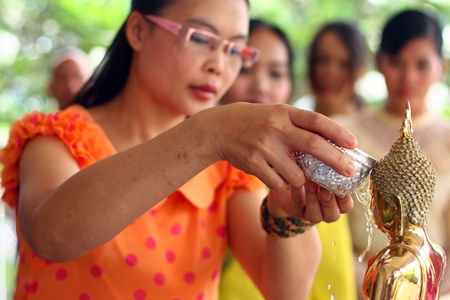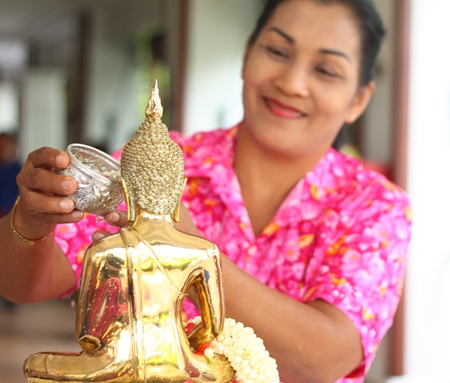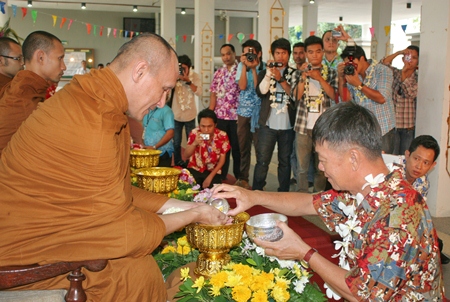Songkran wasn’t always a war of water. It began thousands of years ago with disciples pouring water for Lord Buddha.
Practiced throughout the Buddhist world under different names, water pouring serves the same purpose in all cultures: to erase the evil from the past year and welcome good for the coming months.
The ceremony can be performed at home or at the temple. At home, most pour water on both statues of Buddha and the elderly, requesting blessing from the lord to protect each home and its residents.
 A woman follows ancient tradition by pouring water on a Buddha statue before gently doing the same on monks at her local temple.
A woman follows ancient tradition by pouring water on a Buddha statue before gently doing the same on monks at her local temple.
People often mix water with natural perfumes and flowers, such as jasmine, rose, or marigold and will use a small bowl to scoop some water and pour on Lord Buddha, making their wishes, then doing the same on the elderly.
In temples, the ceremony is usually done after worshippers have offered alms to monks. The temple will then organize time for people to pour water on monks and a statue of Buddha.
Pouring water on monks harkens back to the time of Buddha, when followers poured water for him before monks received their blessings. Many see the act as an important symbol of their faith.
The origin of the custom springs from a fable of Buddha, while residing at Chetavan Mahavihan with 500 monks, receiving Phra Jao Passenthikosol to present items to pay their respects to Lord Buddha. They took their seats and asked, “My lord, what does one, who has performed the holy water pouring ceremony with sincerity, gain?”
Buddha is said to have replied that “those who believe in the Three Jewels of Buddhism – Lord Buddha, dharma, and monks – will have their desires fulfilled.”

Buddha added that a priest king named Vichaiya, who had completed all 10 virtues required of a king, invited a senior monk named Ussa to his palace and had poured water on him and offered a meal. His desire was that all who lived within his land follow Buddhist teachings and for his enemies to disappear. The legend said that, when Vichaiya died, he entered the Dusit heaven in a 22-tier golden palace with 100,000 angels as maids.
The water ceremony remains popular today among Thais, who travel to temples throughout the country to perform the rite. The most popular sites for this is Phra Kaew Bussarakham in Ubon Ratchathani and Luang Pho Thuad in Prachuab Khiri Khan.





